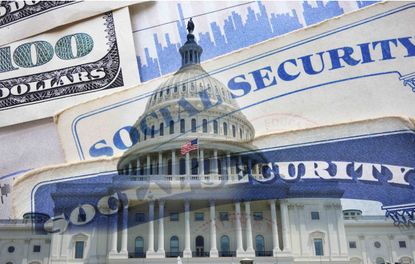What Could the Election Mean for Social Security and Medicare?
With the presidential election just days away, here's a look at Harris vs. Trump on Social Security and Medicare.


As the presidential election nears, Social Security and Medicare are at the forefront of many American's minds. Americans’ top priority for the President and Congress is to address Social Security’s funding shortfalls to help people have a financially secure retirement, according to a study from the Transamerica Center for Retirement Studies.
This makes sense, considering the Social Security trust fund is projected to become insolvent in 2035. Medicare's hospital insurance benefits are expected to run out of money in 2036.
More than 66 million people in the United States receive health care coverage through Medicare. As of June 30, 2024 (the most-recently available data), nearly nine out of ten people age 65 and older were receiving a Social Security benefit. Social Security benefits represent about 30% of the income of people over age 65.

Sign up for Kiplinger’s Free E-Newsletters
Profit and prosper with the best of expert advice on investing, taxes, retirement, personal finance and more - straight to your e-mail.
Profit and prosper with the best of expert advice - straight to your e-mail.
Here's what the upcoming election could mean for both Social Security and Medicare.
Harris on Social Security and Medicare
Harris strongly supports Social Security and opposes any plan that would reduce or cut Social Security benefits. In August, she wrote on Facebook that if elected President, she would work to “protect and expand” Social Security benefits, claiming they’ve “made the difference between poverty or peace of mind for millions of seniors, people with disabilities, and other beneficiaries.”
According to the official policy proposal, Vice President Harris is committed to strengthening and protecting Social Security and Medicare. For one, she plans on making corporations and the wealthiest Americans pay their fair share in taxes to keep Social Security and Medicare solvent in the long run.
Additionally, Harris will expand savings on prescription drugs for all Americans by President by extending Medicare’s $35 monthly cap on insulin and the $2,000 annual cap on prescription drugs, initially implemented by the Inflation Reduction Act, to all Americans, as well as accelerate Medicare drug price negotiations to cover more drugs and lower prices faster.
The Harris-Walz Administration will also build on the Butch Lewis Act and protect millions of union pensions.
Read our article, Harris' Stances on Social Security and Medicare, to learn more.
Trump on Social Security and Medicare
According to Trump’s campaign platform, the administration says it will “fight for and protect Social Security and Medicare with no cuts, including no changes to the retirement age.” Trump has also proposed cutting taxes on Social Security, but that could potentially cause more harm than good. Entirely exempting taxes on Social Security benefits could drive the program into insolvency even faster, according to the Committee for a Responsible Federal Budget.
While in office, Trump made no significant progress in remedying Social Security and Medicare's funding issues. Each of his yearly federal budgets proposed cuts in Social Security, Medicare and Medicaid, primarily in reduced payments to healthcare providers and hospitals.
Additionally, in October 2019, then-President Trump published the Executive Order on Protecting and Improving Medicare for Our Nation’s Seniors, which included an overhaul of the Medicare for All program.
Read our article, Trump's Stances on Social Security and Medicare, to learn more.
Impact of the election on Social Security and Medicare
Significant Medicare and Social Security changes are “unlikely without strong congressional support,” said Mark Friedlich (VP, US Government Affairs, Tax & Accounting North America at Wolters Kluwer).
“If Harris wins, expanding Social Security and Medicare benefits is possible but would likely face opposition in a divided Congress,” he said. “Significant cuts to Social Security and Medicare are unlikely if Trump wins, given his campaign promises. Some reforms to reduce ‘waste’ or ‘bad management’ might be proposed, but sweeping changes would face opposition."
Bottom line
Both candidates support Social Security and Medicare but have different approaches to protecting these programs. Harris plans to make corporations and the wealthiest Americans pay their fair share in taxes to keep Social Security and Medicare solvent in the long run, while Trump, on the other hand, has proposed cutting taxes on Social Security altogether.
However, Congressional gridlock could prevent major changes to these programs. The makeup of Congress will ultimately determine any changes to Social Security and Medicare, as significant reforms would need bipartisan support.
Related Content
Get Kiplinger Today newsletter — free
Profit and prosper with the best of Kiplinger's advice on investing, taxes, retirement, personal finance and much more. Delivered daily. Enter your email in the box and click Sign Me Up.

Erin pairs personal experience with research and is passionate about sharing personal finance advice with others. Previously, she was a freelancer focusing on the credit card side of finance, but has branched out since then to cover other aspects of personal finance. Erin is well-versed in traditional media with reporting, interviewing and research, as well as using graphic design and video and audio storytelling to share with her readers.
-
 Stock Market Today: Dow Jumps 1,500 points on Election Outcome
Stock Market Today: Dow Jumps 1,500 points on Election OutcomeThe removal of election uncertainty unleashed a powerful rally in equity markets.
By Dan Burrows Published
-
 Federal Reserve Meeting: Updates and Commentary
Federal Reserve Meeting: Updates and CommentaryKiplinger experts provide commentary and analysis on the November Federal Reserve meeting.
By Kiplinger Staff Last updated
-
 Are You an Estate Planning Procrastinator? Where to Start
Are You an Estate Planning Procrastinator? Where to StartQuit putting it off, because it's vital for you and your heirs. From wills and trusts to executors and taxes, here are some essential points to keep in mind.
By Alex Diaz, MBA, CFP® Published
-
 Election Poll Surprise Driven In Part by 65+ Female Voters
Election Poll Surprise Driven In Part by 65+ Female VotersJ. Ann Selzer pointed to voters aged 65+, and female voters in particular, as an explanation for the surprising presidential election poll results.
By Alexandra Svokos Published
-
 Is It Too Late to Do a Roth Conversion if You're Retired?
Is It Too Late to Do a Roth Conversion if You're Retired?The short answer is: Not at all. Roth conversions can be great tax-saving strategies … for the right people. Are you a good candidate?
By Arrin Wray Published
-
 Five Options for Retirees Who No Longer Need Life Insurance
Five Options for Retirees Who No Longer Need Life InsuranceIf you're retired and you've checked with your financial planner that life insurance is no longer vital, here are five ways you can turn it to your advantage.
By Evan T. Beach, CFP®, AWMA® Published
-
 Five Financial Planning Secrets of Millionaires
Five Financial Planning Secrets of MillionairesYou might be surprised: Most millionaires don't feel rich. Instead, they have smart goals, discipline and a little help along the way.
By Kevin Dwyer, CFP®, CLU® Published
-
 10 States Where Retirees Get Smaller Social Security Raises
10 States Where Retirees Get Smaller Social Security RaisesGeography doesn't dictate how much Social Security you will receive. However, employment opportunities, pay scale and lifetime earnings impact your monthly benefit greatly.
By Donna LeValley Published
-
 Here's Why You Shouldn't Put All Your Money Into Roth IRAs
Here's Why You Shouldn't Put All Your Money Into Roth IRAsConverting a tax-deferred account to a Roth can be a good strategy for lowering future taxes, but moving all of your money at once is typically not recommended.
By Joe F. Schmitz Jr., CFP®, ChFC® Published
-
 Three Advantages of These Underrated Accounts for Retirees
Three Advantages of These Underrated Accounts for RetireesUsing taxable accounts for some retirement savings in the 10 years before and after retirement can give you greater flexibility and benefit your heirs.
By Evan T. Beach, CFP®, AWMA® Published